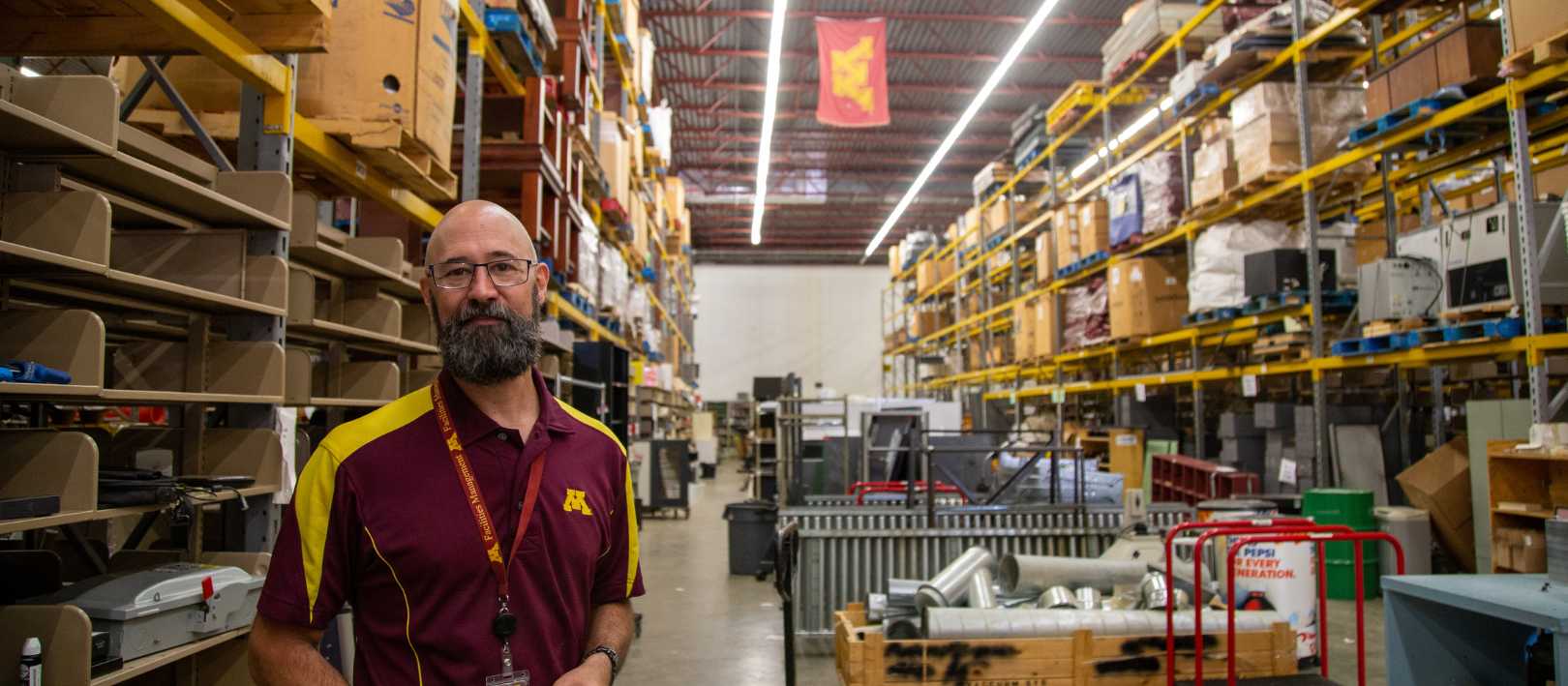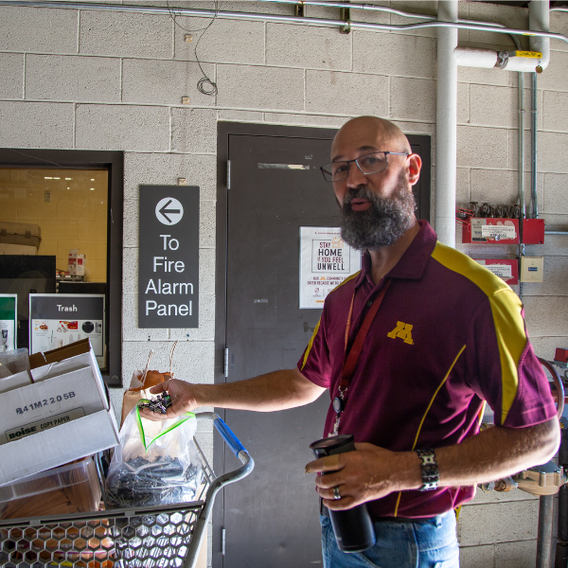HR Update

Meet Todd Tanner, our Zero Waste Program manager! Todd manages the ReUse Program, and he also develops and enhances University programs for keeping recyclables and organics out of landfills.
“I first worked at the ReUse warehouse as a student at the U of M. When the ReUse coordinator job opened up in 2015, it was a natural fit for me. I have a DIY ethos, I’m an outdoor enthusiast, and I’m passionate about sustainability. I have kids, and I want them to enjoy the outdoors just like I have,” said Todd. “In early 2019, they added work with the Recycling Program to my job description and I became the University’s first Zero Waste Program manager.
ReUse Program
The University’s ReUse Program takes surplus University materials and redistributes them to departments in need or sells them to the public. Resellers are frequent customers at ReUse, so much so that ReUse staff knows them by name.
"To that end, we follow Regents policy to be good stewards of University funds and price items appropriately. At the same time, we want resellers to turn a profit since they’ll help us fulfill our mission: to find a good second home for materials.”
How do they know what a fair price is? “We do a lot of Googling around here. We need to know what things are selling for and also what people are interested in.”
“I have a really cool microscope on display in my office with its original case and power supply. Someone offered me $50 for it, and because I had done my research I knew that it would go for $1,500 or more. I couldn’t give it away at that price.” It now sits on Todd’s shelf that displays some of his favorite finds. But most of the interesting things that come across his desk are sold to make money for the University. In fact, everything on Todd’s shelf is still available for sale, just not for $50.
“The biggest sale [by price] I ever made was a collection of maps that were going to be given away. When I saw them, I knew there would be a market for them. They sold for $40,000, and 90% of the profit was shared back to the department that had owned them.”
ReUse’s Impact
“The work that I do makes a difference,” said Todd. “I work with a team of 35–40 full-time, part-time, and student employees to divert materials from landfills and incinerators.”
The ReUse program also saves money for the University. “We estimate that Twin Cities departments are able to find materials that would cost a total of about $350,000 annually,” said Todd. Instead, departments get most things for free at ReUse.
And, ReUse sells on average $350,000 worth of materials to the public annually. Many of the materials sold could cost money to dispose of, but instead Todd and his team help the University make money off its castoffs.
Additionally, ReUse provides direct help to students. Twin Cities students can take advantage of summer storage at ReUse–something that comes in handy since many leases end at the end of July, but the student’s next lease may not start until September. For only $20 a month, students can be sure that their items will be safely stored in ReUse’s warehouse.
Follow ReUse
ReUse is known for puns on its Facebook page, which is used to share new arrivals and other updates. Who writes the puns? “My staff and I run the Facebook page, and I like to say if you found a pun really funny, then I wrote it,” said Todd with a smile. “But my creative team comes up with most of them!”
Follow ReUse for the jokes and the latest updates on what’s available. You never know what’ll show up next.
When asked about the strangest thing he’s seen come through ReUse, Todd said, “One time, a truck full of mannequins rolled up to our dock. There were legs and arms sticking out everywhere. I wish I had taken a picture.”

Recycling Program
In his work with the Recycling Program, Todd and his team are finalizing the rollout of the Twin Cities campus-wide organics project. “We want to make recycling organics as natural as recycling bottles and cans. [To that end] we put organics recycling bins next to just about every indoor trash and recycling station on campus.
“Next we’re working on rolling it out with Athletics. We’re four years into a two-year rollout due to COVID and other factors, but we’ll get it done.”
Todd and his team are working on a way to recycle Styrofoam by processing it into plastic ingots. He expects for the densifier to be up and running in fall of 2022.
“We reduce the Twin Cities’ campus waste on average by 45% of what it would be. Our goal is to get this number up to 50% in the short term and higher in the coming years.”